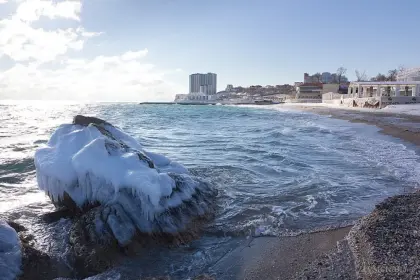The winter of 2022-2023 promises to be particularly difficult due to the Russian invasion. Is the Odesa region ready for the heating season? How should users prepare their home for the cold?
On Aug 30, Odesa Regional Military Administration (OVA) announced that the region is 80 percent ready for the heating season. Particular attention has been paid to power grids: Kyiv Electric Networks (DTEK) is renovating 900 energy facilities in the region and has repaired 600 kilometers of power transmission lines of various voltage levels.
JOIN US ON TELEGRAM
Follow our coverage of the war on the @Kyivpost_official.
“It is important to increase the stability of the energy system and reduce its accident rate,” said Anton Shalygailo, director of the regional energy efficiency department.
Yuriy Zvelindovskyi, head of the Local Initiative Foundation, shares this opinion: Residents of buildings could turn on additional electrical appliances and this would create a load on the networks.
“The condominiums or housing associations, depending on the form of management, need to pay attention to the state of intra-house networks, but DTEK is on the network outside the home. Therefore, the city government should involve the territorial administration of State Energy Inspectorate and the regional representative office of the NCRECP (National Commission for Energy Regulation and Communal Services) to control this process,” the expert of DTEK noted.
Tariffs and houses without meters
The tariffs for heating will not be changed, because at the end of July the Odesa City Council adopted a law imposing a moratorium on price increases on the gas market and in the field of heat supply.
However, residents of apartment buildings in Odesa which still do not have meters can expect a repeat of the previous heating season, where, in some cases, the price per square meter reached 110 Hryvnia (Hr), and the monthly bill was almost 8,000 Hr. There are a lot of such houses in the city.
Two weeks before the full-scale invasion, the Odesa City Council allocated 43.5 million Hr to equip them with meters but they did not manage to buy the equipment in time: The batch arrived in mid-August due to the military operations.
The meters are being installed, but whether they will have time to equip all the houses is an question. Their residents should ask their condominiums or management companies (which remain in housing and communal services) when this will happen. A list of these buildings is available in a video on the social network page of city council member Lilia Leonidova.
Debt before the heating season
A separate problem is consumer debt for heating. In Odesa, it has already exceeded one billion Hr, a record figure according to the heating engineers who add that the payment of debts would help the city to get through the heating season. Other than communication with the residents, there are no other levers of influence for the local authorities: During the summer, the people’s deputies forbade collecting debts from citizens for housing and communal services during martial law.
How to prepare for cold weather
Condominiums, which – despite military operations – are planning, have started or are already carrying out insulation of buildings, are moving in the right direction.
“Insulating the house is important. This is a guarantee for the future. It is wrong to ignore it now because of the war. This does not solve the problem,” explained Stanislav Draganov, head of the Association of Co-Owners of Apartment Buildings.
If the residents of apartment buildings have the opportunity to spend the winter outside the city, it is worth considering such an option, Draganov added.
Heat Supply listed simple measures to prepare their homes for the cold weather:
- Almost a third of all heat escapes from homes through gaps in doors and windows. Elementary sealing measures will help to raise the temperature in the apartment by 2-3 °C (seal windows, insulate doors and implement other heat-saving measures).
- If the radiators don’t get hot enough, airlocks can be a problem. To solve the problem, drain excess air from the radiators before the cold.
- The foiled heat-reflecting screen installed between the radiator and the wall makes it possible to reduce heat loss behind the radiator by 2.5 percent.
- Maintenance of the heating system is important. Heating radiators must be clean both outside and inside. Covering radiators with decorative plates, panels, even curtains reduces heat output by 10-12 percent.
- The wider the window sill, the less heat escapes through the window.
- New windows have an extremely high degree of thermal insulation, especially compared to wooden ones.
- Heat losses through front doors and broken windows in entrances can be about 5-15 percent of the total heat losses of the house. Caulk the front doors and glaze the windows in your entryways. This will help keep the heat in all rooms of the house.
You can also highlight the text and press Ctrl + Enter



